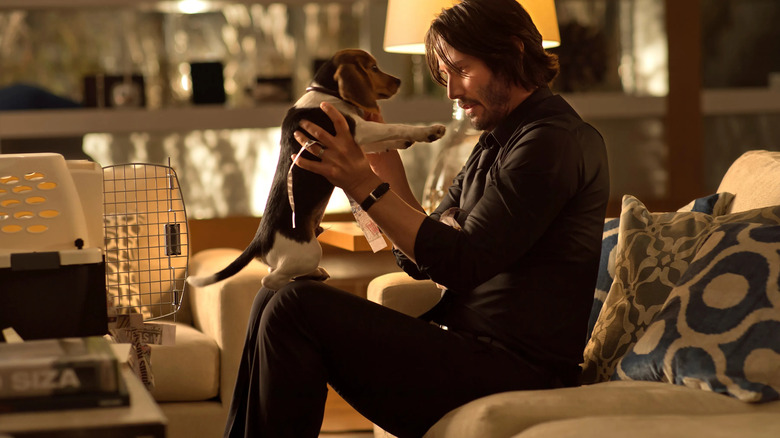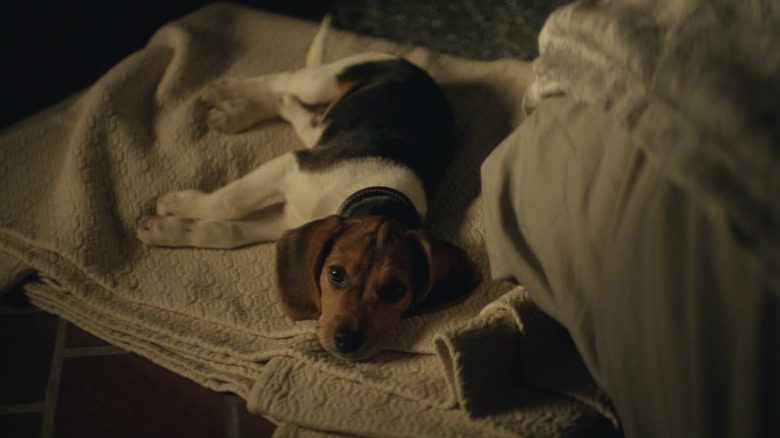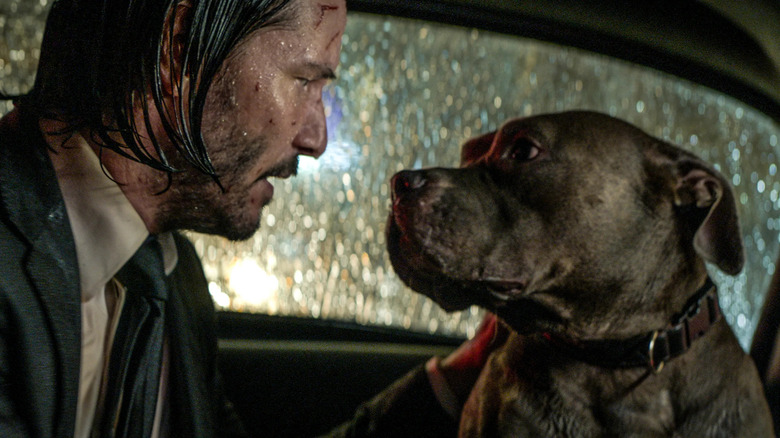The Decision To Kill John Wick's Dog Was Hotly Debated Behind The Scenes
If you watch the first 10 minutes of the first John Wick movie — and only those first 10 minutes — what you'll get is a beautiful story of a grieving widower finding love and purpose from his wife's posthumous gift to him: a sweet little beagle named Daisy. The dog is remarkably well-behaved for a puppy, which we'd later find out is because dogs just naturally listen to and respect John Wick. (John's second dog also follows John's directions absurdly well, despite John barely spending any time with him.) John's supernatural skills with dogs aside, it's clear straight away that he loves Daisy more than anything, and Daisy loves him.
But as we all remember, Wick's house is soon invaded by mobsters. They catch the retired Wick off guard, incapacitate him, steal his car, and most tragic of all, they kill his dog. It's a devastating moment, not just because of who John has lost, but because murdering a puppy is quite possibly one of the most blatantly evil things a person can do. A puppy is the epitome of innocence; not only can nobody reasonably consider one a threat, but nobody can ever claim it did anything bad enough to deserve death.
As the prevalence of websites like Does the Dog Die? make clear, a lot of viewers really don't like it when stories kill off a cute animal. Even with "Cocaine Bear," which centered around an animal far more dangerous than a puppy, the movie didn't dare kill off the bear at the end. Despite it having mauled lots of humans to death, audiences were still mostly on board for the bear's triumphant finale; we simply love animals that much. In other words, killing John's dog was a very risky storytelling choice, and the "John Wick" filmmakers knew it.
A decision not made lightly
"That was probably our biggest, I guess issue, biggest battle — Or I wouldn't say battle, but definitely the biggest conversation piece is whether or not to kill the dog here," co-director Chad Stahelski explained in the "John Wick" audio commentary. He also told The Hollywood Reporter in March this year that "Killing the puppy was written out as many times as it was written back in [....] You don't even know how much [co-director] Dave [Lietch] and I stressed about that. Holy s**t, we were risking credit cards, a house mortgage, everything. [Producer] Basil Iwanyk put his company up. And then you have that day where you realize we're doing all this and we're killing a puppy? I thought we would never come back from it."
The main naysayers, by the sound of it, were the studio executives who were concerned such a heinous act would lead to viewers walking out of the theater. The movie's screenwriter, Derek Kolstad, told ComicBook.com in 2020 that the studio heads once informed them, "'Let's cut the dog out. Let's just focus on it as an assassin coming out of retirement.' That kind of thing."
But in the end, the movie's success spoke for itself. The first movie was a big, unexpected critical and financial hit, spawning three sequels that were each bigger and better than the last. John Wick's become one of our culture's most beloved modern action heroes, and a lot of that comes down to his deeply sympathetic, relatable urge to murder every single person even vaguely connected to the guy who killed his dog.
More of a myth than a man
In the end, letting the dog live was never a real option; poor Daisy's demise was what grounds Wick's whole character. Despite all his rage and violence, Wick is defined by his unabashedly tender love towards what's often described by other characters as "just" a dog. Wick's respect for the rare innocents of his world is his most sympathetic trait.
The killing of the dog also works because of how much it takes a page from the logic of Greek mythology, where every action tends to be as dramatic as possible and half-measures don't seem to exist. Just like how the Trojan Horse has become a metaphor for any sort of invasive trickery, the death of John's dog is also a metaphor for the inherent cruelty of this world, the way that John's lifestyle as an assassin will always force his loved ones to live on a knife's edge. "Ultimately, it's mythological," Stahelski told THR. "We had to go so overboard, so extreme to push it to let you know that it was absolutely symbolic. We're not trying to hold the realism. We want the viewers to know we're having a laugh."
Derek Kolstad also agreed that killing off Daisy was the right choice, one that was absolutely vital for the story to work:
"Without that dog connection and without that underlying soul and the heartbeat of that character, and also the levity it brings the character and the levity it brings the humor, it was key [...] At certain points, Chad and Dave, they fought for it, they got it and they were right."


